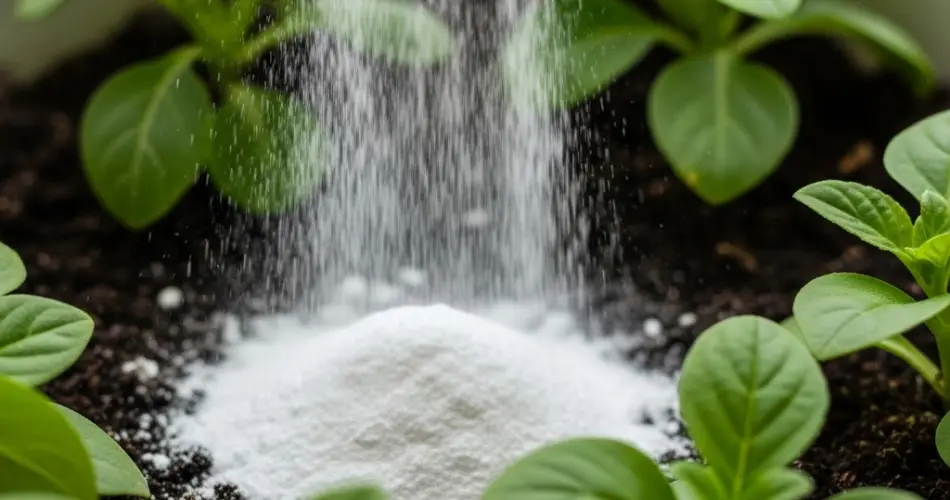Baking soda, or sodium bicarbonate, is one of the most versatile items in the household. While commonly found in kitchens for baking or cleaning, it also plays a surprisingly helpful role in gardening. This simple white powder can become your plants’ best friend when used correctly. Let’s explore the ways baking soda can improve plant health, prevent diseases, and enhance your gardening success.
1. Natural Fungicide for Fungal Diseases
One of the most well-known benefits of baking soda in the garden is its ability to combat fungal infections. Many gardeners use it as a natural alternative to chemical fungicides. When applied correctly, baking soda alters the pH on the leaf surface, making it harder for fungal spores to survive and spread.
Common uses include:
-
Powdery mildew: This is a frequent issue in cucumbers, squash, roses, and grapevines. Mix 1 tablespoon of baking soda, 1 teaspoon of vegetable oil, and 1 teaspoon of liquid soap into 1 liter of water. Spray this mixture on affected plants once a week.
-
Black spot on roses: The same solution helps reduce black spots and improve plant appearance.
Always test on a small part of the plant before full application to ensure there’s no adverse reaction.
2. Discourages Pests Naturally
Baking soda can be used to help deter certain garden pests. While it’s not as strong as commercial insecticides, it provides a gentle, non-toxic option for keeping your garden healthy.
-
Cabbage worms and slugs: A simple mix of baking soda and flour (in equal parts) can be sprinkled on cabbage or lettuce leaves to discourage worms from feeding.
-
Ant deterrent: Sprinkle baking soda around anthills or near entry points to discourage ants from settling in.
Be careful not to overuse it, as too much baking soda in the soil can disrupt its natural balance.
3. Sweetens Tomatoes
Some gardeners believe that baking soda, when lightly sprinkled around the base of tomato plants (without touching the stem), can reduce the acidity of the surrounding soil. This may lead to sweeter fruit. While this effect may vary depending on your soil composition, it’s a simple experiment that’s easy and safe to try.
4. Weed Control Between Pavers
If you have stubborn weeds growing between cracks in sidewalks or pavers, baking soda can help. Simply wet the area, sprinkle baking soda directly into the cracks, and the high sodium content will help dry out the weeds. It works best on small, isolated patches and should be used sparingly to avoid harming surrounding plants.
5. Cleans Garden Tools and Pots
Dirty tools and containers can harbor fungi, bacteria, and pests. Baking soda acts as a natural abrasive and deodorizer, making it ideal for cleaning. Mix it with a bit of water to form a paste and use it to scrub tools, pots, and even greenhouse surfaces. Rinse thoroughly after cleaning.
6. Refreshing Compost Bins
If your compost bin develops a strong odor, a sprinkle of baking soda can help neutralize the smell. It doesn’t stop the decomposition process but reduces the acidic buildup that causes foul odors. However, it should be used in moderation as too much can slow microbial activity.
7. Deodorizing the Garden Shed or Greenhouse
Just like it does in the fridge, baking soda can absorb unwanted smells in your garden spaces. Place an open container of it in a corner of your garden shed or greenhouse to neutralize musty or chemical odors.
8. Testing Soil pH (Simple Home Method)
Baking soda can help you roughly estimate your soil’s pH at home. Take a soil sample, add water to make mud, then sprinkle baking soda on top. If it fizzes, your soil is likely acidic (low pH). This isn’t as precise as lab testing, but it can give you a quick sense of your garden’s needs.
Precautions When Using Baking Soda in the Garden
While baking soda offers many benefits, it should be used with caution:
-
Too much can harm soil microbes and alter pH levels.
-
Always test sprays on a small area of a plant before treating the whole.
-
Avoid spraying during the heat of the day to prevent leaf burn.
Baking soda should be part of a broader natural gardening approach, not a cure-all. When combined with good watering, composting, and plant rotation practices, it can become a valuable addition to your green thumb toolkit.
Final Thoughts
Baking soda is a cost-effective, eco-friendly way to address many gardening challenges. Whether you’re battling fungi, cleaning tools, or just experimenting with tomato flavor, this kitchen staple can enhance your gardening routine in gentle but effective ways. With mindful application, it truly can be your plant’s new best friend.



